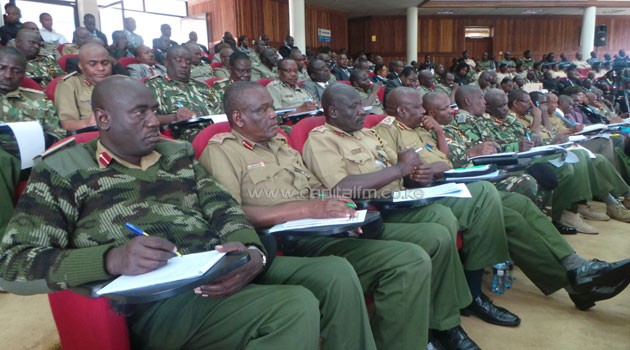
The Act provides for distinct roles and functions of the Kenya Police Service and Administration Police Service. It also gives the police a robust mandate and strengthens internal accountability.
NAIROBI, Kenya, May 27- A new report by a civil society group on the status of police reforms indicates that at least 60 percent of proposed changes have been implemented in the National Police Service.
The report by Usalama Watch Forum however shows that the reforms are yet to reach the grassroots, pointing out that only 15 percent of reforms implemented so far have shown significant impact in communities.
“The main challenge is the translation of the above mentioned reform activities, amongst others, into tangible result at the community level. The public is yet to see improvement in service delivery and change in policing culture and image,” it indicates.
“The service has not demonstrated that it is improving its effectiveness; quality of service to the public… responding to the ever changing environment, as well as improving the welfare of police officers.”
While presenting the report, the forum’s lead consultant George Otieno attributed this to low public awareness on the ongoing police reforms.
“The police need to improve their effectiveness in performance of their functions at all levels. They must do something that people can see,” he said.
“You find that there are press conferences held by the police service but they are really not having dialogue with the public on issues that matter to them.”
He said there should be a well organised communication channel from the police for the public to understand the changes being made within the police service.
On police vetting, the report shows that lack of proper understanding on the commission vetting regulations by the public has resulted to a low understanding and low level of participation in the vetting process.
Otieno noted that the over 2,000 respondents in 18 counties, proposed that the National Police Service Commission should support public awareness campaigns on the objectives of the vetting process and the role of the general public in a bid to build public confidence in the vetting process.
“The commission should also ensure that mechanisms are put in place to protect members of the public and police officers who are willing to provide serious information against police officers about misconduct, to discourage the possibility of intimidation,” he stated.
Some of the key achievements it highlights include the establishment of the Independent Policing Oversight Authority, the National Police Service Commission and Police Internal Affairs Unit.
The National Police Service Act, 2011 gave effect to Article 243 of the Constitution and provides for the administration of the National Police Service under the command and control of the Inspector General and two deputies.
The Act provides for distinct roles and functions of the Kenya Police Service and Administration Police Service. It also gives the police a robust mandate and strengthens internal accountability.
The National Police Service Commission Act, 2011 gave effect to Article 246 of the Constitution.
It established an independent commission overseeing appointments, promotions and transfers of police officers, to address corruption in recruitment and career management as well as disciplinary matters.
The Independent Policing Oversight Authority Act, 2011 gave effect to the provisions of Article 244 of the Constitution that provides for the police to strive for professionalism and discipline and demands of the officers to promote and practice transparency and accountability.
It established an independent civilian oversight body over the National Police Service to investigate allegations of police misconduct and human rights violations.
The authority was also assigned the task to investigate any death or serious injury suspected to have been caused by a member of the police to prevent excessive use of force and abuse of police powers.
Despite enormous efforts on building police-public relationship, the report indicates that public confidence has dropped to the lowest level since 2008 at 36 percent.
“Amongst the reasons given for this low level of confidence include police asking for bribes, police intimidating the public, police not treating members of the public fairly, and police getting involved in crime,” Otieno said.
The number of respondents with confidence in the police ability to provide an ordinary day-to-day policing service has dropped since 2012.
Only 28 percent had some, a lot or total confidence in the police’s ability to provide a day-to-day policing service in their community area compared to 34 percent in 2012.
This was attributed to, ” low number of police officers or police patrols in the community area; police officers not responding to calls for help, police officers not being approachable, police officers asking for bribes and police officers ignoring criminal activities in the community area.”
Among the pending reforms to implement is failure of the National Police Service Commission to determine the maximum number of police officers of the National Police Service.
The report also says that, “although new recruitment guidelines have been developed the National Police Service Commission is yet to put in place transparent and accountable mechanisms to promote gender, ethnic and regional balance in the service. The commission has not yet conducted headcount and assessment of gender and regional ethnic diversity in the service.”
“Inspector General David Kimaiyo is yet to produce National Policing Plans setting out clear priorities and strategies for addressing challenges facing the police including crime and insecurity. There is also yet to be seen clear proposals on determination, establishment and maintenance of police stations and their boundaries.”









































